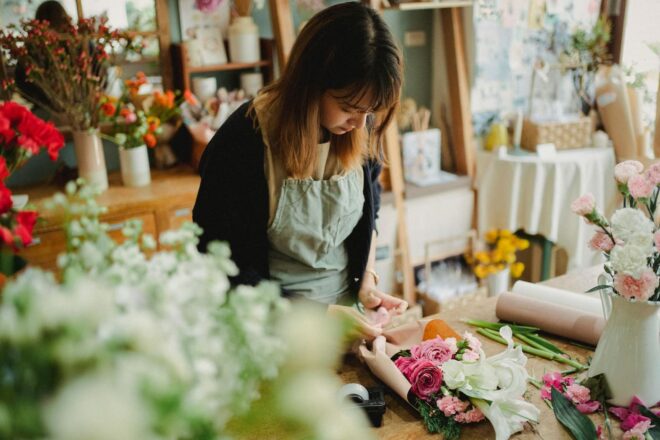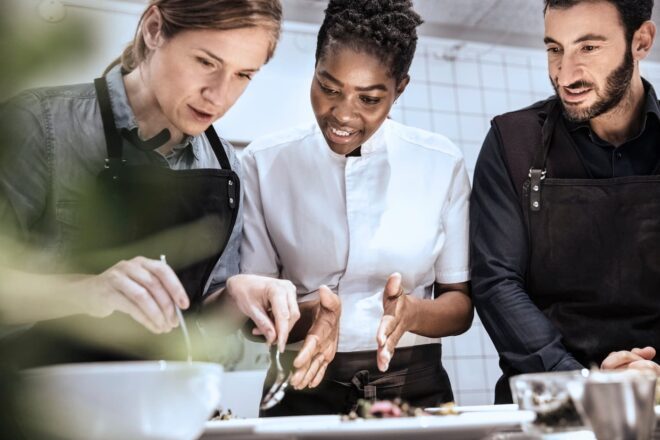3 local bookstores on harnessing the power of community
Editorial Team
6 min read
A local bookstore can be so much more than a place to pick up the latest beach read. Far from the simple, in-and-out, transactionary nature of some shops, many independent bookstores around the country operate as nerve centers for a community.
They’re a place to come in, chat with friends and neighbors, or listen to their favorite author speak. They’re a literary watercooler where book discussions and recommendations are commonplace, and taking all the time you need to browse for your next big read is encouraged.
While the emergence of digital books and big retailers has steadily shrunk the number of independent bookstores in the country, there are still thousands of them holding strong, often supported solely by the fierce community love they tend to generate. According to the U.S Census, bookstores still generate billions of dollars in sales every year.
The fact is, any small business can look at a local bookstore and learn something not only about how to stay in business, but about how to become a pillar of the community. Three independent bookstores from across the U.S. share how they’ve managed to grow powerful local roots that have kept their doors open despite the economic turbulence of the last few years.
Create a place for conversation
Sheila Allen Avelin opened Big Blue Marble in Philadelphia in 2005 and modeled it after the indie bookstores that populated her childhood growing up in Washington D.C. The store sits in the middle of Mt. Airy in Northwest Philadelphia — a diverse neighborhood with a strong sense of community. Avelin wanted to embrace that old-fashioned neighborhood feel when she opened Big Blue Marble, and today, the shop is a vibrant hub for community events and conversations.
“We engage with our community, far beyond simply selling books,” employee Jennifer Sheffield told The Guardian. “We host events and discussions that are urgent for our community and provide experts and activists who help customers understand complex issues,” chimed in Elliott batTzedek, Big Blue Marble’s events manager.
As a lesbian-owned shop in a diverse and socially conscious neighborhood, Big Blue Marble proudly operates as a space for the important and often difficult conversations of the day. “While we have plenty of readings of fiction and poetry, we also have authors, teachers, and leaders talking about the most important topics in our community,” says batTzedek.
On top of that, the space frequently hosts local authors for talks and readings. On one occasion, a neighbor hosted an event for his collection of short stories, and more people showed up than they knew what to do with.
“Seventy people showed up,” said batTzedek. “We had standing room only on the first and second floors and the staircases. He kept bringing more of his books in boxes from his car.”
Create a business community
Until 2021, Lucy Yu, a chemical engineer by training, worked as a supply chain manager for a food company. Burned out, and finding solace in books, she decided to make a radical change and pursue a lifelong dream of opening up a bookstore featuring works from Asian Americans, authors of color, immigrants, and others from marginalized communities.
That dream is now Yu and Me Books, New York City’s first Asian American woman-owned bookstore located in Manhattan’s Chinatown. “The community in Chinatown is phenomenal,” Yu told CNBC. “It’s the most I’ve felt at home in a neighborhood living in New York City. Every shop owner shows up for each other.”
Yu, whose first step toward entrepreneurship was Googling “how to run a bookstore” also found support within Chinatown’s local business community, and has been able to frequently turn to them for advice. “While creating my business plan, I called a couple different bookstores for guidance and heard from Noelle Santos of the Lit. Bar in the Bronx,” said Yu. “Emma Straub from Books Are Magic in Brooklyn reached out to me pretty early on in my GoFundMe campaign. She showed up on my opening day with her kids. She owns a bookstore — she doesn’t need books from a different bookstore! But the amount of love she brought to me before she even knew me to show her support was above and beyond.”
Create a place for comfort
When the pandemic struck in early 2020, it changed life for all of us. For Ginger Mills, owner of The Book Nook in Anderson, Indiana, it meant closing down her store for 10 weeks due to safety precautions. When she re-opened the shop, she immediately began to notice a change in her clientele and their buying habits.
“They came in to be prepared for the long haul, if we got shut down again,” Mills told The Herald Bulletin. “People were depending on books for their free time activities — they couldn’t go to movies, they couldn’t go to ballgames — but they could read.”
The pandemic, it seems, had gotten people to not only fall back in love with books, but with their local bookstores. That love, according to Mills, has grown even stronger over the past two years. Instead of buying books one or two at a time, customers are filling shopping carts with dozens. The Book Nook has seen the sharp increase in sales that other indie bookstores around the country are also experiencing.
According to the American Booksellers Association, indie bookstores aren’t just surviving post-pandemic, they’re thriving. In a 2022 survey, the association found that 80% of bookstores experienced higher sales in 2021 than in 2020. The association is also steadily adding new members, and predicts that at least 200 additional stores are preparing to open in the next year or two. “It’s kind of shocking when you think about what dire straits the stores were in in 2020,” said Allison Hill, the chief executive of the American Booksellers Association, to The New York Times. “We saw a rally like we’ve never seen before.”
For Mills, the rally is thanks to the ever-present, ever-comforting quality of books and local bookstores.
“There’s been a lot of gloom and doom about bookstores for a long time, and books just going away, but we’ve not ever seen that as the case,” Mills told The Herald Bulletin. The comfort of a bookstore, and reading in general, has been cast into sharp relief by the pandemic. It seems people have rediscovered the power of a good book, and more and more, are turning to their local shop to get their hand on their next read. “People have had things on their bucket list maybe for decades and they’re finally getting to it,” says Mills. “Pretty much anything you can think of, they’ve been reading it.”
To learn how you can use Clover’s bookstore POS system to engage with customers in your community, contact a Clover Business Consultant today.
Other articles you may like
- Build your business by tapping into your community
- Corporate social responsibility: 3 ways to change the world with your small business
- Connect your business to your community with a new Clover app
Related Posts
Should your florist shop offer subscriptions?
Full Service Restaurants (FSR)
12 restaurant entertainment ideas to keep guests coming back
Popular Topics
Stay in touch
Sign up and learn more about Clover.
Thank you for your subscription!
More posts about starting a small business
eBook





